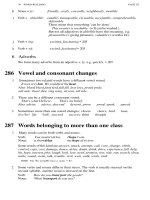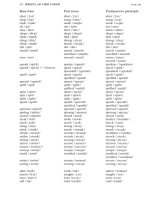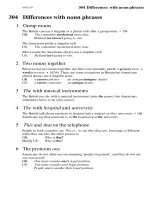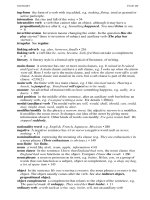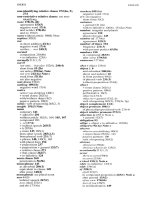Tài liệu Oxfore guide to english grammar part 59 doc
Bạn đang xem bản rút gọn của tài liệu. Xem và tải ngay bản đầy đủ của tài liệu tại đây (76.62 KB, 7 trang )
GLOSSARY PAGE 400
ing-form the form of a verb with ing added, e.g. making, flying, used as gerund or
active participle.
intonation the rise and fall of the voice • 54
intransitive verb a verb that cannot take an object, although it may have a
prepositional phrase after it, e.g. Something happened. You must listen to me.
• 8
invert/inversion Inversion means changing the order. In the question Has the
play started? there is inversion of subject and auxiliary verb (The play has
started.).
irregular See regular.
linking adverb e.g. also, however, finally • 216
linking verb a verb like be, seem, become, look, feel that can take a complement
• 9
literary A literary style is a formal style typical of literature, of writing.
main clause A sentence has one or more main clauses, e.g. It rained or It rained
and I got wet. A main clause can have a sub clause, e.g. I woke up when the alarm
went off. Here I woke up is the main clause, and when the alarm went off is a sub
clause. A main clause can stand on its own, but a sub clause is part of the main
clause. •239(2)
main verb the finite verb in a main clause, e.g. I like classical music. Hearing a
knock, he jumped up. Your friend will expect us to be ready.
manner An adverbial of manner tells us how something happens, e.g. sadly, in a
hurry. • 209
mid position in the middle of the sentence, after an auxiliary verb but before an
ordinary verb, e.g. I was just writing a note. For details • 208(4).
modal (auxiliary) verb The modal verbs are will, would, shall, should, can, could,
may, might, must, need, ought to, dare.
modifier/modify In the phrase a narrow street, the adjective narrow is a modifier.
It modifies the noun street. It changes our idea of the street by giving more
information about it. Other kinds of words can modify: I've got a tennis ball. We
stopped suddenly.
nationality word e.g. English, French, Japanese, Mexican • 288
negative A negative sentence has n't or not or a negative word such as never,
nothing. • 17
nominalization expressing the meaning of a clause (e.g. They are enthusiastic) in
a noun phrase (Their enthusiasm is obvious.) • 149
non-finite See finite.
noun a word like desk, team, apple, information •141
noun clause In the sentence I knew that England had won, the noun clause that
England had won functions as the object. Compare I knew the result. • 260
noun phrase a noun or pronoun on its own, e.g. butter, Helen, you, or a group of
words that can function as a subject, object or complement, e.g. a shop, my bag,
a lot of spare time • 143
object In the sentence He was wearing a sweater, the noun phrase a sweater is the
object. The object usually comes after the verb. See also indirect object,
prepositional object.
object complement a complement that relates to the object of the sentence, e.g.
The quarrel made Al unhappy. They voted her their leader. • 11
ordinary verb a verb such as write, stay, invite, sell, not an auxiliary verb
PAGE 401 GLOSSARY
pair noun a plural noun like jeans, pyjamas, glasses • 155
participle See active participle, past participle, passive participle.
participle clause a clause with a participle as its verb, e.g. Arriving home, I found
a parcel on the doorstep. We saw a ship launched by the Queen.
passive The sentence Someone stole my coat is active, but My coat was stolen is
passive. A passive verb has be and a passive participle: was stolen. • 103
passive gerund e.g. No one likes being made to look foolish.
passive infinitive e.g. to be done, to be expected
passive participle the form of a verb used after be in the passive, e.g. The room
was cleaned, and used before a noun, e.g. We don't eat frozen food.
past continuous a form with the past of be and an active participle: It was raining
at the time. • 66
past participle the form of a verb used after have in the perfect, e.g. They have
arrived. How long has he known?
past perfect a form with had and a past participle, e.g. / had answered the letter
the week before. • 68
past perfect continuous a form with had been and an active participle: I saw that
it had been raining. • 68
past simple the past tense without an auxiliary, e.g. it stopped, they left • 65
perfect a verb form with have and a past participle, e.g. The film has started.
• 61(3)
perfect gerund e.g. He denied having taken the money.
perfect infinitive e.g. to have done, to have waited
perfect participle e.g. Having paid the bill, we left.
performative verb When we say I agree to express agreement, we are using a
performative verb, one which expresses the action it performs. Others are
promise, apologize, suggest, refuse. • 16(3)
person First person relates to the speaker (7, we). Second person relates to the
person spoken to (you). Third person relates to other people and things (he, she,
it, they).
personal pronoun e.g. /, you, he, we • 184
phrasal verb a verb + adverb combination, e.g. get up, look out, turn off
phrase a word or group of words that is part of a clause, e.g. your friend (a noun
phrase), was asking (a verb phrase) • 4
plural A plural form means more than one. Tree is singular; trees is plural.
positive I'm ready is positive; I'm not ready is negative.
possessive a form expressing the idea of something belonging to someone, or a
similar relationship, e.g. my chair, theirs, whose sister, Diana's job
possessive determiner my, your, his, our etc • 174
possessive pronoun mine, yours, his, ours etc • 174
predicative the position of an adjective after a linking verb such as be, e.g. The day
was cold.
prefix Minibus has the prefix mini. Unhappy has the prefix un. • 284
preposition a word like on, by, to, with • 223
prepositional object In the sentence We sat on the floor, the noun phrase the floor
is a prepositional object, the object of the preposition on.
prepositional phrase a preposition + noun phrase, e.g. on my way, in the garden,
to you, or a preposition + adverb, e.g. before then.
prepositional verb a verb + preposition combination, e.g. look at, pay for,
believe in
present continuous a form with the present of be and an active participle, e.g. we
are waiting • 64
GLOSSARY PAGE 402
present perfect a form with the present of have and a past participle, e.g. it has
arrived, we have begun • 65
present perfect continuous a form with the present of have + been + active
participle: she has been working all day • 67
present simple the present tense without an auxiliary, e.g. we know, she travels
• 64
pronoun A pronoun is a word that functions like a noun phrase, e.g. you, he,
ourselves, someone. • 183
quantifier a word saying how many or how much, e.g. all, some, half, a lot of,
enough
question a sentence which asks for information • 21
question phrase a phrase with what or how, e.g. what time, how long • 28
question tag a short question added to the end of a statement, e.g. That was nice,
wasn't it? • 34
question word These words can be used as question words: who, whom, what,
which, whose, where, when, why, how. • 27
reflexive pronoun a pronoun such as myself or themselves referring to the subject,
e.g. David blamed himself for the accident. • 186
regular A regular form is the same as most others; it follows the normal pattern.
The verb call has a regular past tense called. But the verb sing has an irregular
past tense sang.
relative adverb where, when and why in a relative clause, e.g. the hotel where we
stayed • 279
relative clause a clause that modifies a noun, e.g. the woman who called
yesterday, the car you were driving, people going home from work • 271
relative pronoun a word like who, which, that in a relative clause, e.g. the person
who started the argument
s-form the form of a verb with s or es added, e.g. The weather looks good.
sentence A sentence can be a statement, question, imperative or exclamation;
• 15. It consists of one or more clauses. A written sentence begins with a capital
letter and ends with a full stop (.) or question mark (?) or exclamation mark (!).
sequence of tenses the use of the same tense in the main clause and sub clause,
e.g. I'm going to Greece because I like it there. (both present), I realized I had
given the wrong answer. (both past)
short answer a subject + auxiliary used to answer a question, e.g. Who's winning?
~ You are. • 29(4) See also yes/no short answer.
short form Some words can be written in a full form or a short form, e.g. have or
've. In the short form we use an apostrophe in place of part of the word. • 55(2)
simple tenses the present simple or past simple tense without an auxiliary, e.g. it
opens, it opened
singular A singular form refers to one thing only. Car is singular; cars is plural.
state verb a verb that refers to something staying the same, not an action, e.g. be,
belong, remain, know • 62
statement a sentence which gives information, not a question or request • 16
stress speaking a word or syllable with more force and so making it sound more
important
strong form See weak form.
sibilant the sounds
and
sub clause See main clause.
subject In the sentence The ship sails in an hour, the noun phrase the ship is the
subject. In a statement the subject comes before the verb.
subject complement See complement.
subjunctive The subjunctive is the base form of a verb. We can use it in rather
formal English in some contexts, e.g. I propose that the money be made available.
• 242
suffix The adverb calmly has a suffix ly. The noun movement has a suffix ment.
• 285
superlative Superlative forms are oldest, most famous, most sharply etc. • 217
syllable The word important has three syllables: important.
tag See question tag.
tag question a sentence with a question tag, e.g. We've got time, haven't we?
tense a form of the verb which shows whether we are talking about the present
(I refuse, he knows, we are) or the past (I refused, he knew, we were) •61(1)
to-infinitive a verb form like to go, to answer, to sleep • 115
to-infinitive clause See infinitive clause.
transitive verb a verb that takes an object, e.g. We enjoyed the meal. The postman
brings the letters. • 8
truth adverb e.g. definitely, possibly, maybe • 214
uncountable noun a noun that cannot have a/an in front of it and has no plural
form, e.g. gold, petrol, music, • 144. An uncountable noun takes a singular verb.
verb In the sentence The parcel arrived yesterday, the word arrived is a verb. Verbs
are words like play, walk, look, have, discover.
verb of perception e.g. see, hear, feel, smell
verb of reporting a verb used to report what someone says or thinks, e.g. say, tell,
answer, promise, think • 265
verb phrase a verb or a group of words that functions as a verb, e.g. opens, went, is
coming, had waited, can swim, must have seen • 57
viewpoint adverbial e.g. economically, weather-wise • 213(3)
vowel The letters a, e, i, o and u are vowels. The other letters, e.g. b, c, d,f, are
consonants.
weak form Some words can be spoken in a strong form or a weak form. For
example, the word can has a strong form
and a weak form .•55(1)
wh-question a question that begins with a question word, e.g. who, what, where
• 24
word class a type of word such as a noun, adjective or preposition • 3
yes/no question a question that can be answered yes or no, e.g. Are you ready?~
Yes, I am. Did anyone call? ~ No. • 24
yes/no short answer an answer such as Yes, it is. or No, they didn't. • 29(2)
PAGE 403
GLOSSARY
voiced/voiceless These consonant sounds are voiceless:
. These consonant sounds are voiced:
. All vowel sounds are voiced.
Index
PAGE 404
The numbers refer to sections, not
pages. For example, 158 means section
158, and 221(3c) means part 3c of
section 221. Numbers in bold type
mean a direct treatment of or main
reference to a topic.
a/an
summary 158
as + adjective + a 221 (3c)
alone hundred 191(1) Note b
leaving out 42(3), 45(2), 45(4)
many a 177(3b)
50 miles an hour 172
with possessive 174(5)
quite a, such a 212(4)
a bit (adverb) 212(1a) Note e, f, 212(7c)
+ comparative 212(2)
a bit more/less 212(8f)
a bit of 177(2a)
a bit of a 212(4) Note b
+ gerund 133(1), 138 (2c)
quite a bit of 212(8c)
a few 177(2), 178(7a)
quite a few 2l2(8c)
a great many 177(1b) Note c
a little
adverb 212(1a) Note f, 212(7c)
+ comparative 212(2, 8f)
+ gerund 133(1)
quantifier 177(2), 178(7a)
a lot
+ comparative 212(2, 8f), 221 (8)
degree 212(7c)
frequency 211(2)
a lot of 177(1), 178(7)
agreement 153(2)
+ gerund 133(1), 138(2c)
quite a lot of 212(8b)
abbreviated clause
with adjective 199(5)
leaving out words 36
patterns with participles 134
participle relative clauses 276
with so/not 43
special styles 45
abbreviations
with a/an 159(2)
capital letters 56(6h)
plural 145(1d)
ability 98
ability
ability at/in 237(2j)
+ to-infinitive 124(1a)
able ending 285(5i)
able
comparison 218(4b)
able to 98(2,3)
about 228(1)
after adjective 236(2)
= approximately 191(4)
and around 225(1) Note d
+ gerund 132(2, 3)
after noun 237(2i)
after say/tell 266(1) Note c
after verb 233(3), 234(5)
about to 78(1a),80(3)
above 225(1), 225(3b), 226(2a)
absent from 236(4)
absolutely 212(1a) Note a, 212(7a)
absolutely no 17(6b)
abstract noun
countable/uncountable 144(1b)
linking with previous text 48(3)
+ of 133(2b)
suffixes 285(2)
without the 165
absurd
quite absurd 212(5c)
the absurd 204(2a)
accept
+ noun clause 262(1c)
performative 16(3)
verb of reporting 265(2)
accommodation: uncountable 144(4b)
accompany + object 233(4)
according to 228(1)
accusative: see object pronoun
accuse... of 234(2)
+ gerund 132(2)
accustomed to 236(4)
+ gerund 132(6)
ache: simple/continuous 62(6)
across 225(1)
and through, along 226(4)
act and action 87(2)
action verb 62
and linking verb 209(1b)
active and passive
summary 103
overview of forms 114
active with passive meaning 113
active participle 134, 135(2)
before noun 137, 283(2) Note
after passive verb 110(2)
in relative clause 276(1)
spelling 64(1) Note a
add
+ noun clause 262(1c)
verb of reporting 265(2)
adding relative clause 274
and identifying clause 272 (4a, 5)
additions (e.g. So do I) 43
adjectival clause: see relative clause
